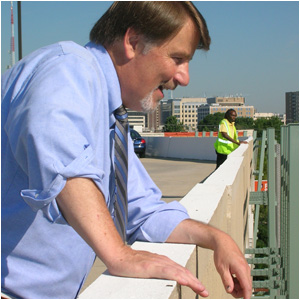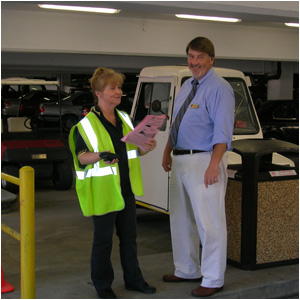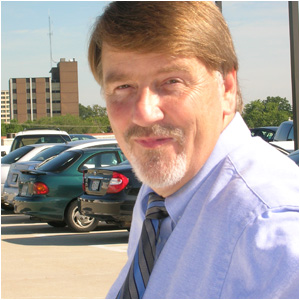Brad Stewart
By Ellen Guettler
It's 7:30 in the morning on the first day of classes. Brad Stewart stands in front of the Montgomery College parking garage. He's vice president and provost of the school's Takoma Park/Silver Spring campus, just outside of Washington, D.C. He's directing traffic.
"I looked at our enrollment numbers this morning," Stewart says. He pauses to wave a car through, telling the driver to look for a space on the third floor of the ramp. Then he says, "We are sitting at 99 percent of our target enrollment."
Enrollment at Montgomery College has gone up 17 percent since 2000, a trend also seen at other community colleges. Today, almost half of all college students in America go to community college. And in a struggling economy, those numbers are growing.
More than 35,000 students take classes in credit programs at Montgomery College each year. Last year there were seven student cars for each parking space. Stewart thinks this year will be worse.
He hopes finding a spot won't be too frustrating, because he doesn't want to lose students. Many of them are already on the brink of dropping out.
"And anything that gets in the way, like - duh - parking, will send some of them away," he says.
More than half of all students who start community college with the goal of getting a degree still don't have one six years later. Stewart acknowledges that there's a lot of failure. But he says community college also offers an opportunity to students who have no other way to pursue higher education. And Stewart wants them to make it.
"[I]t's possible for a student from limited financial means - a recent immigrant to this country, someone who comes from a poor family in an inner city area or a rural area - to come to Montgomery College and get a chance at the American Dream," Stewart says. "They know somewhere deep inside…that this is the chance that they will have to make it to the middle class, if they're not a member of the middle class."
Brad Stewart sees himself in some of these students. Stewart grew up in Iowa, the son of white, working-class parents. When he was in college, he'd spend summers back home, hauling sacks of flour at the warehouse where his father worked.
Stewart's college education was a ticket out of that life. He went on to be a sociology professor, and then a dean. But he never felt truly comfortable as an administrator to students from more privileged backgrounds, students who'd expected all their lives that they would go to college.
And he worried that kids who grew up the way he did wouldn't be able to afford tuition at those same institutions.
"I was fortunate enough back then to get into a four-year college with a financial aid package that made it affordable," Stewart says. "I left college $300 in debt instead of $30,000 in debt. Nowadays, that's a dicey proposition. Private colleges are difficult for students in my financial situation to afford."
When he took his job as vice president and provost at Montgomery College, Stewart felt he'd found his home. He believes community colleges are crucial in the task of educating America.
"You work hard and you go to college and you play by the rules and most of the time, what's really appealing about coming to America from Central America or from West Africa is that you'll succeed if you do that," he adds.
Many of the students at Montgomery College, like those at other community colleges, actually were born in places like El Salvador or Liberia. The students here hail from 169 different countries. Many others are first-generation Americans. White students are a minority at the college.
One reason is cost. Annual tuition for a full-time student is about $4,000, a sum many students can afford between grant money and financial aid. Students often live with their parents, working to support themselves and their families. Some have children of their own. Many are the first in their families to go to college.
"That's kind of the beauty of this place," Stewart says. "Everybody gets a chance."
Back to Rising by Degrees.



